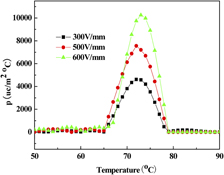Article contents
High pyroelectric properties of (Pb0.87La0.02Ba0.1)(Zr0.75Sn0.25–xTix)O3 ceramics near AFE/RFE phase boundary under DC bias field
Published online by Cambridge University Press: 31 May 2011
Abstract

(Pb0.87La0.02Ba0.1)(Zr0.75Sn0.25–xTix)O3 (PLBZST, 0.07 ≤ x ≤ 0.09) ceramics were prepared by the conventional solid state reaction process, and their crystal structural, ferroelectric (FE), dielectric, and pyroelectric properties were systemically investigated. A transformation from antiferroelectric (AFE) phase to FE phase was observed when x was higher than 0.08. With the content of Ti increasing from 0.07 to 0.09, the dielectric peak was steeper and the pyroelectric coefficient was greater under direct current (DC) bias fields. As the DC bias field increased from 300 V/mm to 600 V/mm, the pyroelectric coefficient increased from 4500 to 10500 μC/m2·K for PLBZST specimens with 0.09. Thus, large pyroelectric response is beneficial for the development of infrared sensors.
Keywords
- Type
- Articles
- Information
- Copyright
- Copyright © Materials Research Society 2011
References
REFERENCES
- 4
- Cited by


